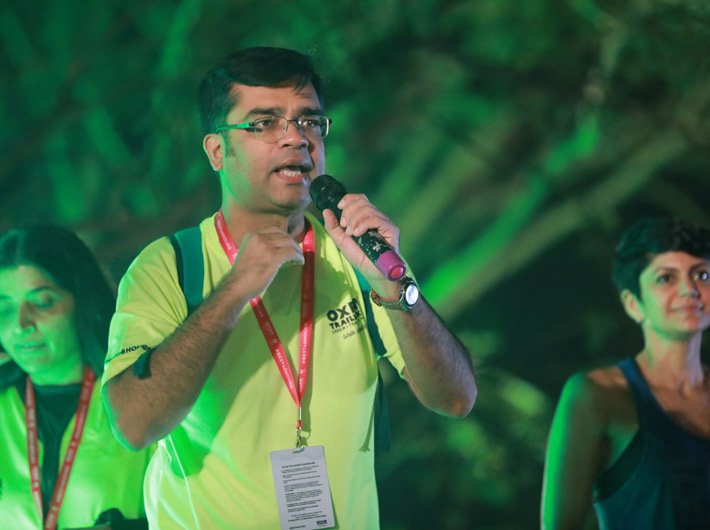Oxfam India CEO Amitabh Behar talks about the event, the pandemic and the civil society sector
Oxfam Trailwalker, arguably India's biggest walkathon-for-a-cause challenge, has gone virtual this year, with participants completing the 100 km walk within or around the confines of their homes over a span of 10 days – from November 20 to November 29, complying with the social distancing rules.
Amitabh Behar, who took over as CEO of Oxfam India in April 2018, and the same year walked the 100km trail at Oxfam Trailwalker in Mumbai and has been participating ever since, talks about the event in a chat with Governance Now:
Dear Mr Behar, walking for cause is an interesting trend of our times, and Oxfam Trailwalker is said to be the biggest walkathon for a cause. Please tell us more about its genesis and its journey so far.
It has indeed become a trend, and a great one at that! Taking up a challenge to not just work towards your personal fitness, but have the opportunity to do good for your community, is a win-win. To add to that, Oxfam Trailwalker brings in the aspect of doing so in a team, which makes it unique.
This is where I’ll give you a very interesting fact — Oxfam Trailwalker began as a team endurance exercise devised by Brigadier Mervyn Lee, for the Queen’s Gurkha Signals in Hong Kong in 1981! It was in 1986 when the event was opened for participation by civilians, and was co-organised by Oxfam.
In India, we are 16 editions old. The first edition was held in Bengaluru in 2012 and we expanded to Mumbai the following year. There were around 500 teams participating during the last editions. Every year, it is heartwarming to welcome more and more people to the Oxfam family!
This year, respecting the Covid-19-induced restrictions, the walkathon is happening virtually, that is, participants are walking 100 km “within or around the confines of their homes over a span of 10 days”, complying with the social distancing rules. How is the response – and the progress?
Yes, necessity is the mother of invention, they say. It was a similar situation for us. Once it was apparent that there would be no physical events, the whole team brainstormed and we decided to enter the virtual world for the first time.
The response has been amazing! Our walkers, our staff members, our donors, they’ve all come in with some great support through their participation. In addition, there have been numerous people and some new corporate houses that joined the cause this year. We have held two Virtual Trailwalker events (two date slots for each) since July, and will be planning more going forward.
What is the key “cause” or causes for Oxfam in India? What are its priority areas?
Oxfam has been working in India since 1951, and became an independent Oxfam affiliate and an Indian NGO in 2008. With an aim to end all forms of discrimination, we have been working rigorously with our on-ground partners in the fields of education and health, gender justice, economic justice and humanitarian aid among others.
This year, a lot of our focus has been on our ongoing COVID-19 relief work that started way back in March 2020 when the migrant workers crisis broke after the first lockdown was announced. We have reached to over 5 lakh people with support in the form of cooked meals, dry ration kits, safety and PPE equipment, cash support and more, in 18 states. Our approach is three-pronged — Protect, Secure, Preserve — and is directed towards long-term relief and rehabilitation.
We have also actively been amplifying our #RightsOverProfits campaign to strengthen India’s public health system and to regulate the private health system, both of which have been under fire, especially during this pandemic.
How does the walkathon help the corporate sector fulfil its CSR obligations?
Over years, corporates have seen Oxfam Trailwalker as an excellent initiative for team-building and also use it as a tool promote fitness among their employees to build healthy lifestyles.
While they get a channel to engage their employees in an intense team-building exercise, they support and strengthen Oxfam India’s work on the ground. Funds raised at Oxfam Trailwalker are utilised by Oxfam India towards our varied programmes and advocacy campaigns. The support we get from our walkers helps us to run women support centres to help fight violence against women across our focus states, help build livelihood opportunities for women farmers, help forest dwellers get their rights, and help us advocate with the government for better quality and affordable education and healthcare for all.
What has been the impact of Covid-19 on the voluntary sector or civil society organisations – especially in terms of more need for their intervention in various social sectors and also on fund flows?
By all means, COVID-19 has shown once again how the voluntary sector and the CSOs are a strong pillar in times of crises. The powerful and important work that such organisations and individuals do is irreplaceable. And these are the very sectors that are seen struggling with fund flows, as you mentioned, in these crucial times. Although there is great support from the public, there still needs to be a more robust government-social sector bonding during times like these.
